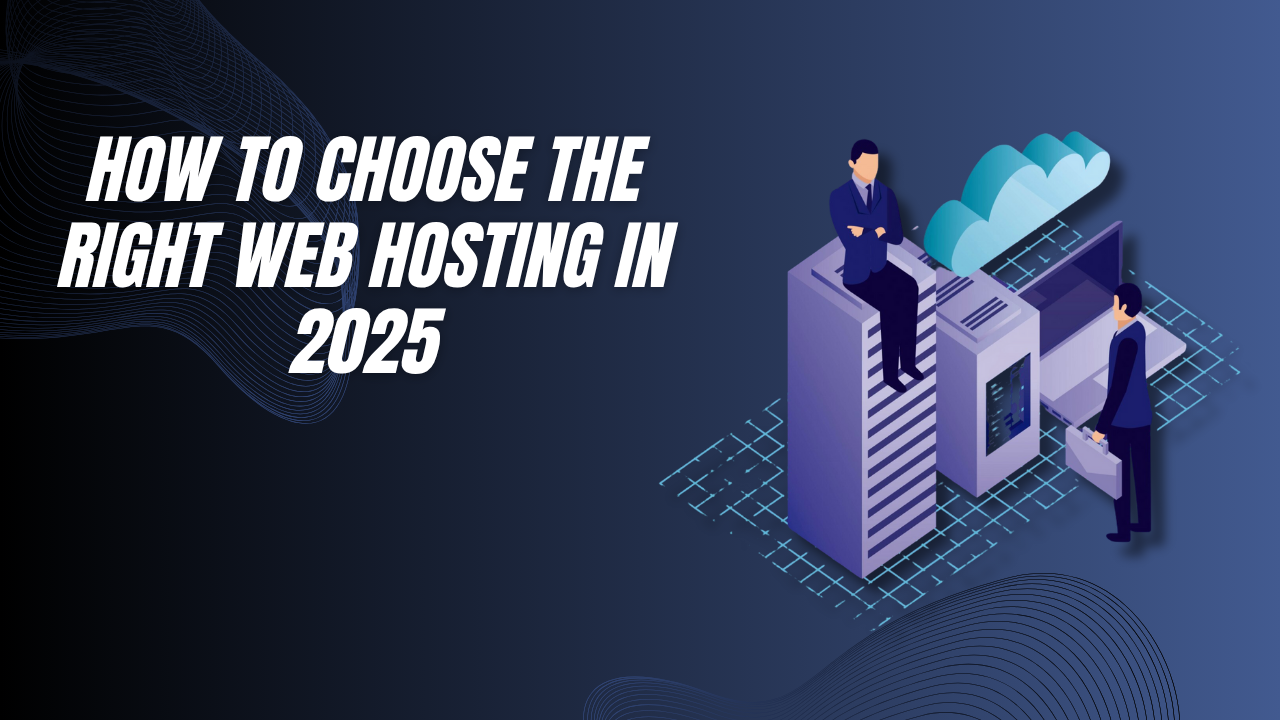20Jun

In 2025, choosing the right web hosting provider is more crucial than ever. Whether you’re launching a personal blog, an e-commerce platform, or a high-traffic business website, your web hosting choice will directly impact site speed, security, SEO performance, and user experience. But with hundreds of hosting companies and plans on the market, how do you know which one is the best fit?
In this comprehensive guide, we’ll break down everything you need to know to choose the right web hosting in 2025—from understanding your website’s requirements to comparing the latest technologies and features offered by leading providers.

Before diving into technical terms, let’s understand why choosing the right web host is so important:
To choose the best web hosting in 2025, begin by identifying:
1.1. Website Type
1.2. Expected Traffic Volume
Higher traffic = higher resource needs. Consider VPS or cloud hosting if you expect sudden traffic spikes.
In 2025, these are the major hosting categories:
2.1. Shared Hosting
2.2. VPS Hosting (Virtual Private Server)
2.3. Cloud Hosting
2.4. Dedicated Hosting
2.5. Managed WordPress Hosting
3.1. Speed and Performance
In 2025, website speed is not optional. Google’s Core Web Vitals directly impact search rankings.
3.2. Uptime Guarantee
Always choose a provider that offers at least a 99.9% uptime guarantee. Anything less could result in frequent outages and lost revenue.
3.3. Scalability
Make sure your hosting can grow with your website.
Security in 2025 is non-negotiable.
3.5. Support Options
24/7 live chat, ticketing systems, and phone support are a must.
3.6. Ease of Use
Beginner-friendly dashboards (like cPanel, Plesk, or custom dashboards) make a big difference.
3.7. Pricing and Renewal Rates
Here’s a quick look at some reliable web hosting companies in 2025:
Host Name | Best For | Starting Price | Notable Features |
Bluehost | Beginners | ₹299/month | Free domain, 1-click WordPress |
Hostinger | Budget | ₹69/month | LiteSpeed servers, free SSL |
SiteGround | Speed & Support | ₹499/month | Excellent uptime, daily backups |
A2 Hosting | Developers | ₹399/month | Turbo servers, NVMe SSDs |
Cloudways | Cloud Flexibility | ₹900/month | Choice of cloud provider, pay-as-you-go |
Web hosting and SEO go hand-in-hand:
Also, consider hosts that offer SEO tools like sitemap generators, analytics, and integrations with Google tools.
Before committing:
While choosing a host, also check:
In 2025, choosing the right web hosting is not just about price—it’s about performance, reliability, support, and security. Whether you’re starting a small blog or scaling a growing business, your hosting decision plays a massive role in your website’s success.
Take your time to analyze your needs, compare hosting types, and read trusted reviews. Don’t fall for flashy marketing—focus on real-world performance and support. With the right web hosting, your site will be fast, secure, and ready to thrive online.
MKU to conducted common entrance test for M Phil, PhD MKU could refer to multiple institutions or organizations. However, one... read more

Key components of a PhD synopsis is a pivotal document in your doctoral journey. It provides a concise overview... read more

Pursuing a PhD is an exciting but demanding academic journey. While it offers opportunities to explore research deeply and contribute... read more

The pursuit of a PhD is a transformative journey that expands your academic horizons and opens doors to global opportunities.... read more

How to Easily Pursue a PhD in India: A Step-by-Step Guide read more
Reconsider draft guidelines on foreign degrees, AIU tells UGC:(AIU) has urged the University Grants Commission (UGC) to reconsider draft guidelines... read more
WhatsApp us
Leave a Reply